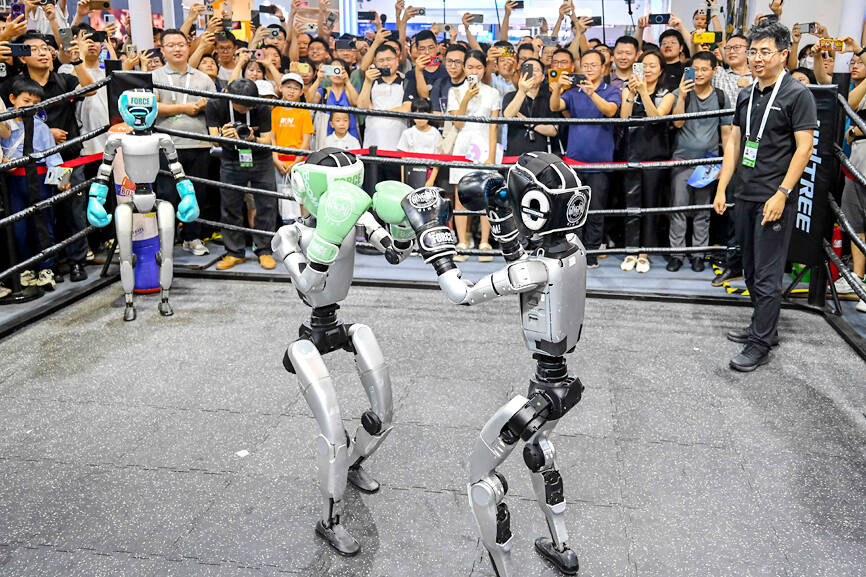Serving craft beer, playing mahjong, stacking shelves and boxing, the dozens of humanoid robots at Shanghai’s World AI Conference (WAIC) this weekend were embodiments of China’s growing artificial intelligence (AI) prowess and ambition.
The annual event is primed at showcasing China’s progress in the ever-evolving field of AI, with the government aiming to position the country as a world leader on both technology and regulation as it snaps at the US’ heels.
Opening the event on Saturday, Chinese Premier Li Qiang (李強) announced that China would set up a new organization for cooperation on AI governance, warning the benefits of development must be balanced with the risks.

Photo: AFP
In the cavernous expo next door, the mood was more giddy than concerned.
“Demand is currently very strong, whether in terms of data, scenarios, model training, or artificial construction. The overall atmosphere in all these areas is very lively,” said Yang Yifan (楊一帆), research and development director at Transwarp Technology Co (星環信息科技), a Shanghai-based AI platform provider.
Organizers said that this year’s WAIC involved more than 800 companies, showcasing more than 3,000 products — the undeniable crowd pleasers being the humanoid robots and their raft of slightly surreal party tricks.
At one booth, a robot played drums, half a beat out of time, to Queen’s We Will Rock You, while a man in safety goggles and a security vest hyped up a giggling crowd.
Other droids, some dressed in working overalls or baseball caps, worked on assembly lines, played curling with human opponents or sloppily served soft drinks from a dispenser. While most of the machines on display were still a little jerky, the increasing sophistication year-on-year was clear to see.
The Chinese government has poured support into robotics, an area in which some experts think China might already have the upper hand over the US. At Hangzhou-based Unitree Technology Co’s (宇樹科技) stall, its G1 android — about 130cm tall, with a two-hour battery life — kicked, pivoted and punched, keeping its balance with relative fluidity as it shadowboxed around a ring.
Most high-tech helpers do not need hardware. At the expo, AI companions — in the form of middle-aged businessmen, scantily clad women and ancient warriors — waved at people from screens, asking how their day was, while other stalls ran demos allowing visitors to create their own digital avatars.
Tech giant Baidu Inc (百度) on Saturday announced a new generation of technology for its “digital humans” — AI agents modeled on real people, which it says are “capable of thinking, making decisions, and collaborating.”
The company recently ran a six-hour e-commerce broadcast hosted by the “digital human” of a well-known streamer and another avatar.
The two agents beat the human streamer’s debut sales in some categories, Baidu said.
For now, few visitors to the WAIC expo seemed worried about the potential ramifications of the back-flipping dog robots they were excitedly watching.
“When it comes to China’s AI development, we have a comparatively good foundation of data and also a wealth of application scenarios,” Yang said. “There are many more opportunities for experimentation.”

NEW IDENTITY: Known for its software, India has expanded into hardware, with its semiconductor industry growing from US$38bn in 2023 to US$45bn to US$50bn India on Saturday inaugurated its first semiconductor assembly and test facility, a milestone in the government’s push to reduce dependence on foreign chipmakers and stake a claim in a sector dominated by China. Indian Prime Minister Narendra Modi opened US firm Micron Technology Inc’s semiconductor assembly, test and packaging unit in his home state of Gujarat, hailing the “dawn of a new era” for India’s technology ambitions. “When young Indians look back in the future, they will see this decade as the turning point in our tech future,” Modi told the event, which was broadcast on his YouTube channel. The plant would convert

‘SEISMIC SHIFT’: The researcher forecast there would be about 1.1 billion mobile shipments this year, down from 1.26 billion the prior year and erasing years of gains The global smartphone market is expected to contract 12.9 percent this year due to the unprecedented memorychip shortage, marking “a crisis like no other,” researcher International Data Corp (IDC) said. The new forecast, a dramatic revision down from earlier estimates, gives the latest accounting of the ongoing memory crunch that is affecting every corner of the electronics industry. The demand for advanced memory to power artificial intelligence (AI) tasks has drained global supply until well into next year and jeopardizes the business model of many smartphone makers. IDC forecast about 1.1 billion mobile shipments this year, down from 1.26 billion the prior

People stand in a Pokemon store in Tokyo on Thursday. One of the world highest-grossing franchises is celebrated its 30th anniversary yesterday.

Zimbabwe’s ban on raw lithium exports is forcing Chinese miners to rethink their strategy, speeding up plans to process the metal locally instead of shipping it to China’s vast rechargeable battery industry. The country is Africa’s largest lithium producer and has one of the world’s largest reserves, according to the US Geological Survey (USGS). Zimbabwe already banned the export of lithium ore in 2022 and last year announced it would halt exports of lithium concentrates from January next year. However, on Wednesday it imposed the ban with immediate effect, leaving unclear what the lithium mining sector would do in the